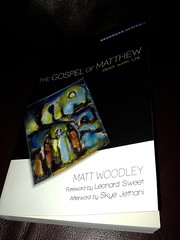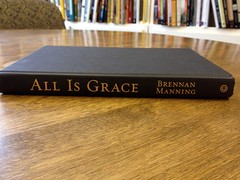I was asked to review this commentary from Likewise Books which is a line of InterVarsity Press. As always, I am not required to write a positive review but an honest one.
What Is It and What Makes It Different From Most Commentaries?
The Gospel of Matthew – God With Us written by Matt Woodley is the new commentary in the Resonate series which is a commentary set. This series is trying to balance academic scholarship with culturally relevant illustrations, stories and ideas to connect today’s preacher with today’s audience. This is definitely a welcomed and long-overdue endeavor.
I chose to review Chapter 12 which includes the healing on the Sabbath, the sign of Jonah and the healing of a demon-possessed man.
What I Liked
I think it does live up to its hope of being cultural relevant. As I read and flipped through other parts, I liked the movies that were mentioned, the songs that were quoted and the other references I came across. I know of no other commentary set using current cultural references as it engages the text. This matters to me because I spend a great deal of time contextualizing my messages to my audience and this is helpful (but of course not designed to be a substitute for the exercise).
 Cultural references include:
Cultural references include:
popular movies like The Fellowship of the Ring and Avatar
references to current events – like the Iraq war.
popular (and some living!) thinkers like Tim Keller, Phillip Yancey, Wendell Berry, C.S. Lewis, and Dr. Seuss
I liked the size of the book. It saves space by not quoting each Scriptural text. The layout is clean and uncluttered too.
What I Would Have Liked to See
My only real critique at this point is that I would like for the commentary sections (and therefore the book) to be longer. My chapter did engage the text sufficiently, however a few others seemed a bit light and I felt that I didn’t get enough background and context overall. For what it’s worth, generally, I use three commentaries (sometimes more if the passage is “tricky”) but I think the true test for your commentary is if you only had enough room in your bag for one, which one you take? Well for me, it’s still going to be The New Interpreters Set which are huge and heavy but if I had a little more room in the bag, i’d squeeze this in too (Assuming Tom Wright’s Everyday Series was already in).
Which brings me to contrast it with Wrights’ series. Wright offers numerous personal anecdotes and generally, I can’t really use them. Not only because I’m not British but if we are honest, many of his are dated. Please don’t report me, Wright fans are similar to the Hauerwasian Mafia, only more passive aggressive but I digress. While I may end up preferring the Resonate Series illustrations more, Wright’s series offers more biblical context and background for the text. That said, I suspect Woodley realized this and this is the among the reasons he quotes Wright’s Everyday Series extensively.
Who I Think It’s Helpful For
I imagine the target audience is people like me – X’ers and Millennials who are teaching present-day pre/post-Christian audience. I do think it’s also helpful for Boomers too who may want to update the messages they’ve had prepared for years.
It’s definitely worth checking out, this volume is under $15 and certainly worth the price – you can get it here and I will likely order the John Commentary (When Love Comes to Town) by Paul Lois Metzger and Ecclesiastes by Tim Keel in to be released in 2012.
Other bloggers who have reviewed this as recent as today include:
Ben Sternke – Great thinker with a great looking blog.
David Phillips – I love his tagline is “faith in a post-everything world”
Jesus Needs New PR – Matthew Paul Turner – The one and only.
 I appreciated his honesty concerning his what I would describe, an almost loveless upbringing, particularly, his relationship with his mom. If you don’t read till the end of the book, you missed it – moving, powerful, Christian.
I appreciated his honesty concerning his what I would describe, an almost loveless upbringing, particularly, his relationship with his mom. If you don’t read till the end of the book, you missed it – moving, powerful, Christian.




Recent Comments